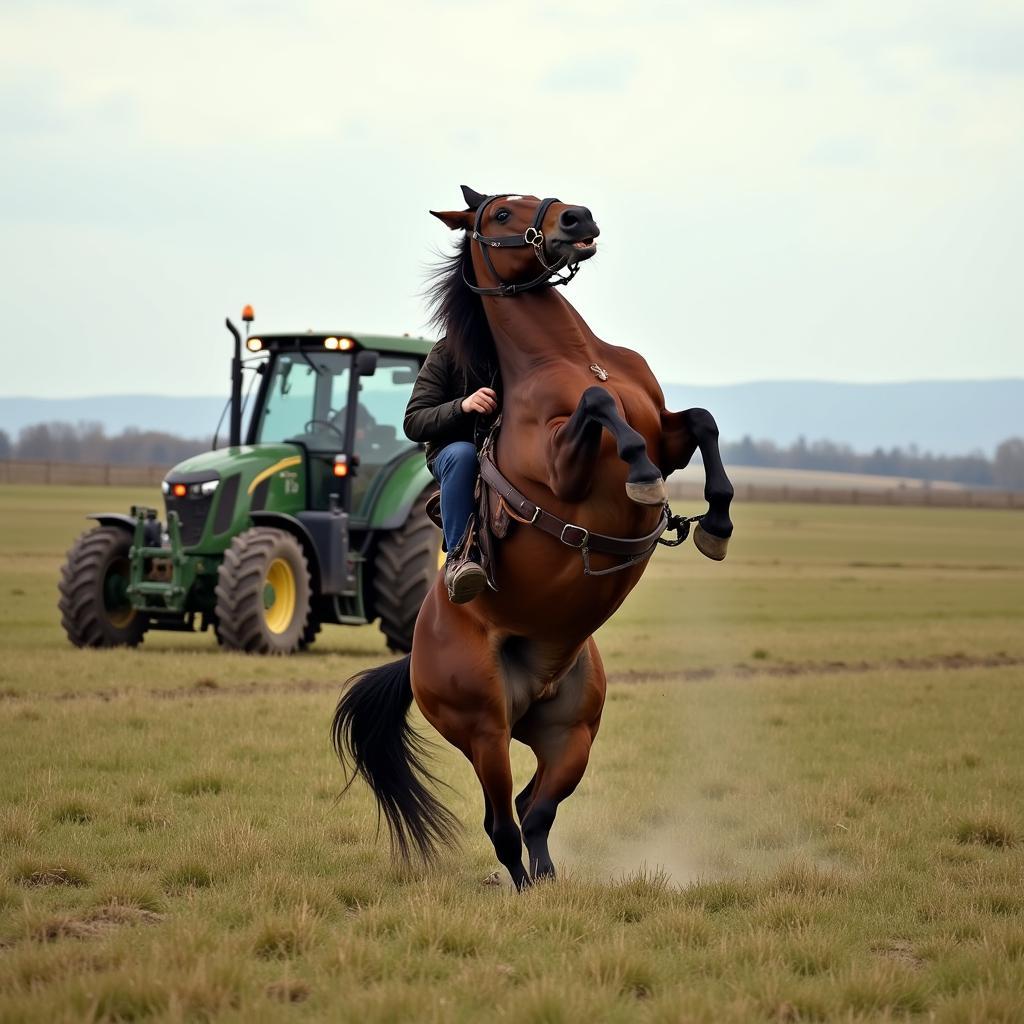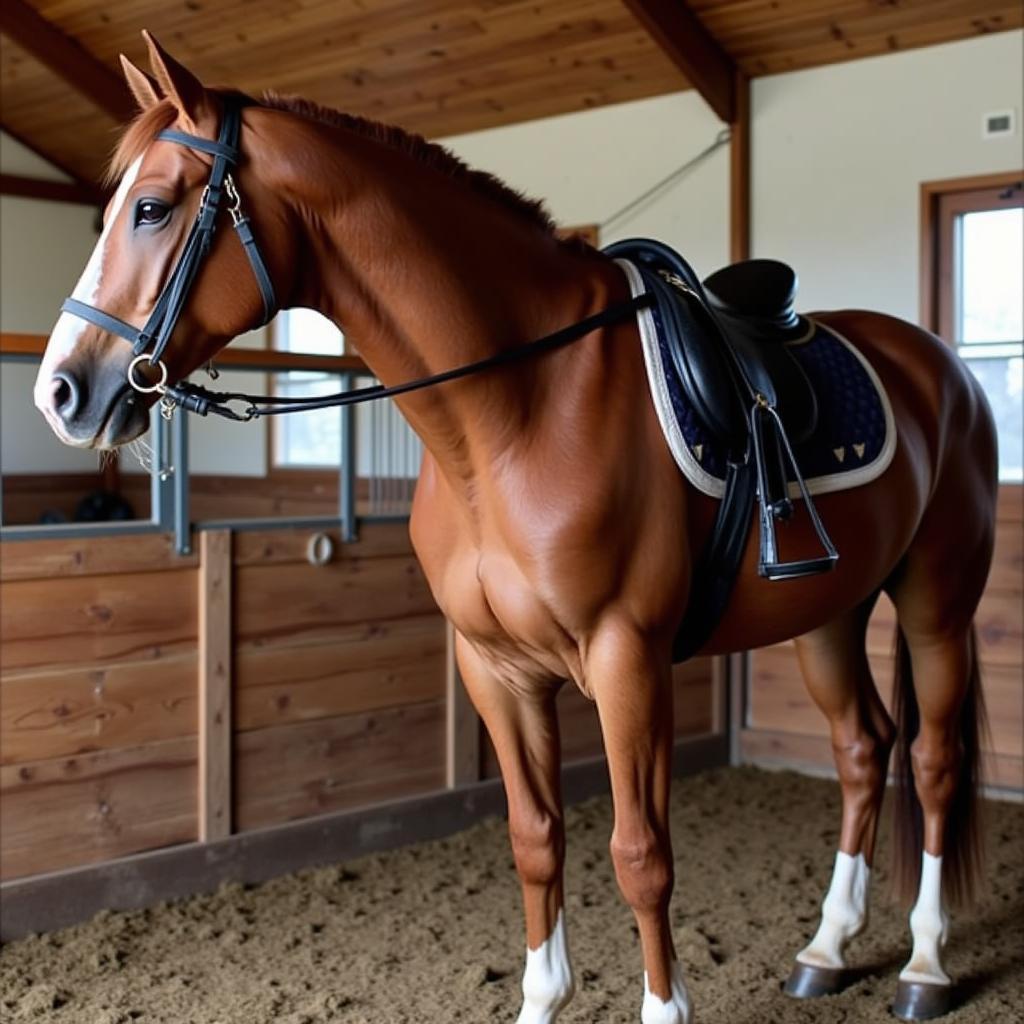Horse And Rider Rearing can be a frightening experience, but understanding its causes and implementing appropriate training techniques can significantly reduce its occurrence. This article explores the complex interplay of factors that contribute to rearing, offering practical advice for both prevention and management.
Why Do Horses Rear?
Rearing is a dangerous behavior where a horse rises up on its hind legs. It’s a natural defense mechanism in the wild, used to fend off predators. However, under saddle, rearing poses a significant risk to both horse and rider. It can be caused by a variety of factors, including fear, pain, excitement, or resistance to training. Sometimes, horses rear out of pure exuberance, especially younger horses. Other times, it can be a learned behavior, a way for the horse to avoid work or control the rider.
Fear and Pain as Contributors to Rearing
A scared horse might rear when confronted with unfamiliar objects or situations. Pain, often subtle and difficult to detect, can also trigger rearing. A horse might rear in response to discomfort from ill-fitting tack, dental issues, or underlying musculoskeletal problems. Identifying and addressing the root cause, whether fear or pain, is crucial for resolving the rearing behavior.
Understanding the horse’s perspective is vital. Imagine being asked to perform a task while experiencing discomfort or fear – a natural response might be to resist. This highlights the importance of building trust and ensuring the horse’s physical and emotional well-being.
 Horse rearing due to fear of a loud noise
Horse rearing due to fear of a loud noise
Training Techniques and Equipment for Managing Rearing
Consistent and patient training plays a critical role in addressing rearing. Clear communication between horse and rider is paramount. Using appropriate aids and cues can help prevent miscommunication and subsequent rearing. Focusing on positive reinforcement and rewarding desired behaviors often proves more effective than punishment.
A rearing horse and rider can benefit from professional guidance. A qualified trainer can assess the situation, identify the underlying causes, and develop a tailored training plan. This plan may involve desensitization exercises for fear-based rearing or addressing pain-related issues through veterinary care and adjustments to tack.
How to Prevent a Horse from Rearing
Building a strong foundation of trust and respect between horse and rider is the cornerstone of preventing rearing. Consistent training, clear communication, and addressing any underlying physical or emotional discomfort are essential.
Understanding Your Horse’s Signals
Recognizing the early signs of potential rearing, such as head tossing, increased tension, or resistance to forward movement, can allow for preventative intervention. Addressing these subtle cues before they escalate into full-blown rearing can prevent dangerous situations.
The Role of Bits and Tack in Managing Rearing
While equipment like a chifney bit for horses can be used in specific situations under the guidance of a professional, it’s important to remember that these are tools, not solutions. Their effectiveness relies on proper usage and addressing the underlying cause of the rearing. Focusing solely on equipment without addressing the root cause can exacerbate the problem.
 Horse wearing correctly fitted tack
Horse wearing correctly fitted tack
Visiting a horse bit shop with a knowledgeable professional can be beneficial. They can help you select the most appropriate bit for your horse’s needs, ensuring proper fit and function.
Conclusion
Horse and rider rearing is a serious issue that demands attention and understanding. By addressing the underlying causes, focusing on clear communication, and implementing consistent training techniques, we can minimize the occurrence of this dangerous behavior. Remember, a calm and confident rider paired with a well-trained horse creates the safest and most enjoyable riding experience.
FAQs
- What should I do if my horse rears while I’m riding?
- Can rearing be completely cured?
- Are certain breeds more prone to rearing?
- How can I tell if my horse’s rearing is caused by pain?
- What type of professional help should I seek for a rearing horse?
- Are there any specific exercises to help prevent rearing?
- What is the role of ground work in addressing rearing?
For support, please contact us at Phone Number: 0772127271, Email: justushorses@gmail.com or visit us at QGM2+WX2, Vị Trung, Vị Thuỷ, Hậu Giang, Vietnam. We have a 24/7 customer support team.